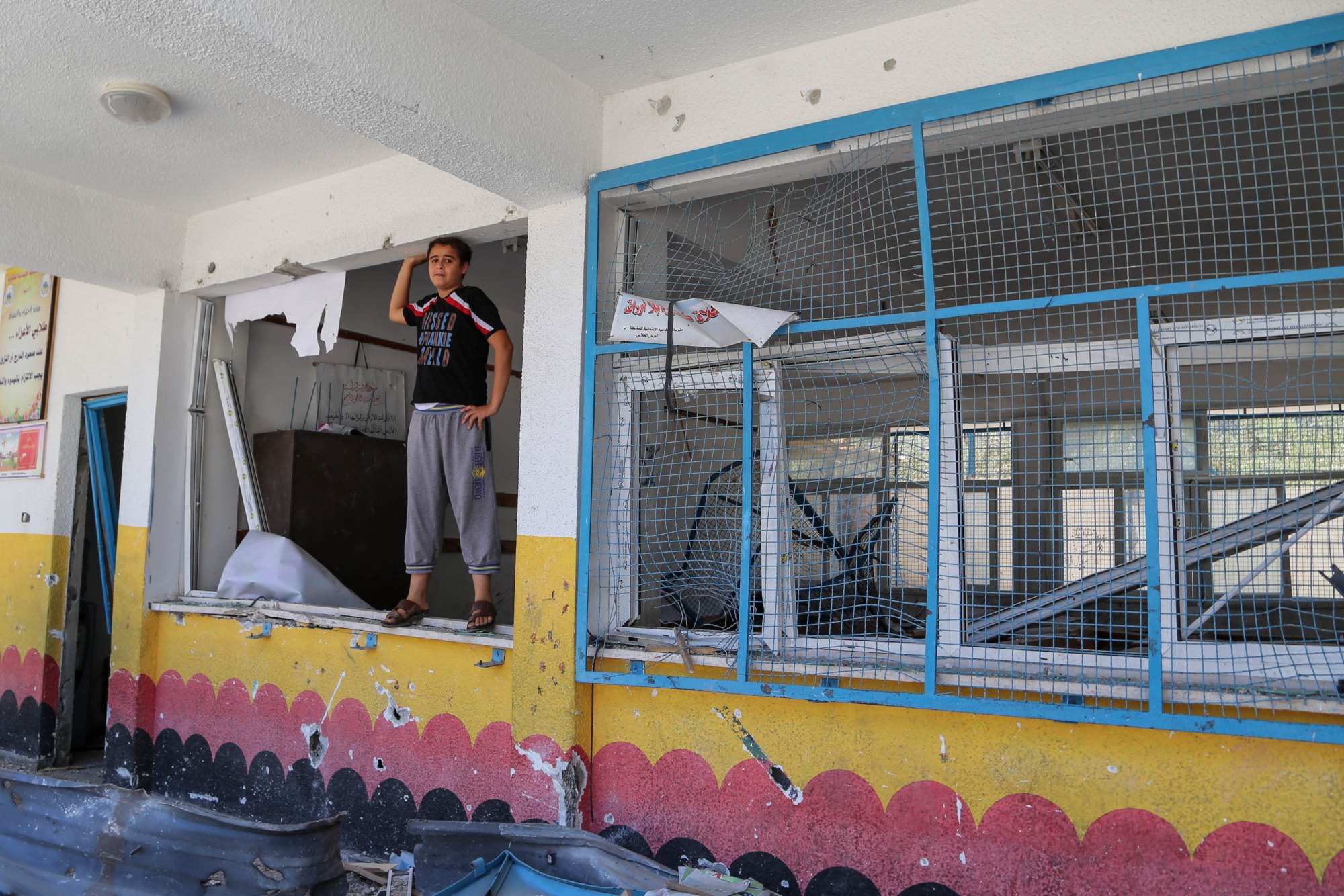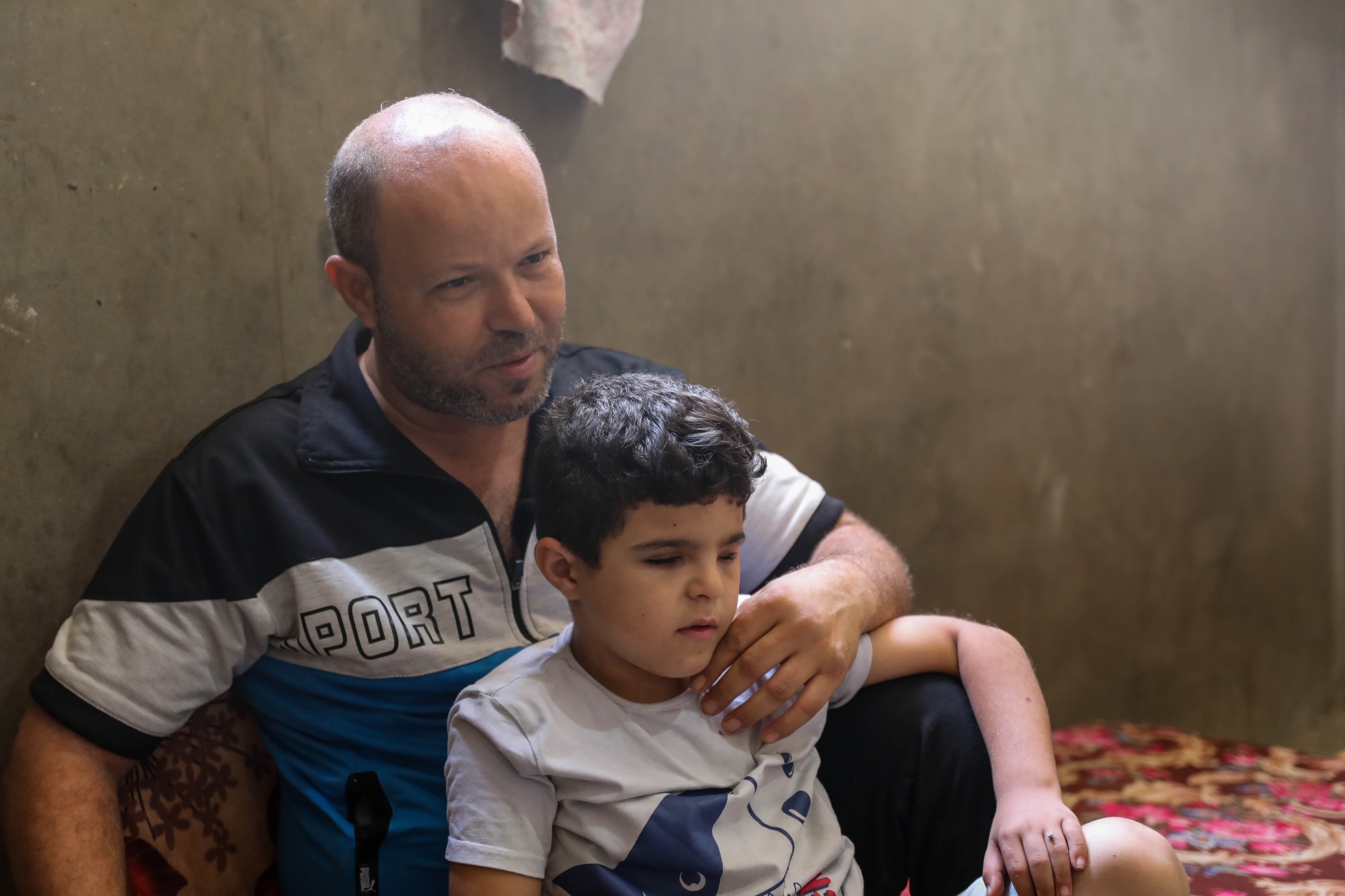Gaza: Disabled or dead, many young victims of Israeli strikes won't return to school

Eight-year-old Mohammed Shaaban sits on the front bench of a classroom listening intently to the teacher, trying his best to follow the lesson.
The second-grader is with his classmates at a school in Beit Lahia, north of the Gaza Strip, but only temporarily. He lost his sight during Israel’s intense bombing campaign on the Gaza Strip, and now the school administration has refused to let him continue to study there as they can't accommodate his disability.
On that fateful day in May, Mohammed had just finished shopping for the holiday of Eid al-Fitr with his mother and cousin when a rocket landed in the marketplace and sent shrapnel flying, some hitting him in the face.
Three weeks later, he was transferred to a hospital in Egypt to receive treatment for the injury. The doctors told his father that Mohammed’s case was “hopeless”.
“One of his eyes had been destroyed by the shrapnel, so there is absolutely no hope in treating it,” his father, Hani Shaaban, told Middle East Eye (MEE).
“The other one was severely damaged, and the doctors told us that he would never be able to see with it again.”
Mohammed’s tragedy was far from unique. According to the United Nations human rights agency, OHCHR, 66 children and 40 women were among the 256 Palestinians killed during Israel’s 11-day attack on the blockaded land. Of the children killed, 51 were school-age students. Around 470 other children were injured in the attacks.
More than 50 educational facilities were damaged in the bombardment, including schools, kindergartens, and the Islamic University in central Gaza.

Furthermore, the Explosive Ordnance Disposal (EOD) team from the interior ministry in Gaza said it had located four unexploded Israeli bombs that remained buried in the ground under schools run by Unrwa - the UN agency for Palestinian refugees.
Living in an 'ugly nightmare'
Elsewhere in Beit Lahia, Mohammed al-Attar, a father of four, recounted the day when he enrolled his six-year-old daughter Amira in the first grade.
“The school principal asked her to count to 10 and to say the letters in Arabic. She did and they were impressed at how clever she was. They admitted her to school and she was super happy,” the father told MEE.
Amira couldn't wait to share the news with her mother as soon as they got home, and her older brother Islam, 8, had already begun planning their first day at school together.
“Islam told Amira that he would walk her to her school in the morning before going to his own school, and then in the afternoon, he would take her home with him.”
His daughter was most excited about shopping for school supplies, and she was adamant about the colour she wanted for her school bag - it had to be pink, Attar said.
He also praised Islam for being both a good brother and student.
“He had ranked first in his class and we were so happy. We kept encouraging him and wanted to buy him a present for his success.”
But the siblings never got to go to school together. "The bombing arrived much faster," said the father.
On 14 May, five Israeli strikes hit Attar’s neighbourhood without prior warning, completely destroying the building that housed six residential flats.
At the time of the attack, Attar’s wife and children were all sitting together at home, while he was with his brother in another room. His wife and three of his children were killed, while he sustained minor injuries.
Just two weeks after her school enrolment, Amira lost her life along with her mother Lamia, 27, and two brothers — Islam, and 5-month-old Zein.
“We had plans for the month when the kids would start school. But here I am, sitting alone with my only remaining child in my mother’s home," Attar told MEE. “Everything happened so quickly that I felt I was dreaming, I have no one now except one child who is only five.
“I honestly still haven’t figured out what to do, and all that had happened felt like an ugly nightmare. I cannot believe that I lost all four of them in a single day.”
Traumatised children
In a survey of 530 children from across the Gaza Strip, a Geneva-based human rights monitor found that nine out of 10 children surveyed had suffered from some form of conflict-related post-traumatic stress disorder (PTSD).
Following the attack, Mohammed, the young boy who lost his eye, changed and now he avoids social interactions with others and prefers to stay alone, his father told MEE.
“His mood changes every 15 minutes, sometimes he starts crying and screaming, and sometimes he finds something to enjoy, but most of the time he is introverted and doesn't talk to people outside of his family,” Shaaban said.
“Every morning, when his siblings get ready for school, he starts crying and asks to go with them, but he cannot go to his old school anymore.”
Shaaban said he talked with the school about letting his newly-blind son continue studying there.
“(The school administration) told us that he could no longer attend regular schools and that we needed to move him to a special school for the blind,” he said.
To appease the devastated boy, the school allowed Mohammed to sit among his classmates and encouraged him to participate in the lesson. "He felt better, but now he wants to go [to his old school] every day," said Shaaban.
Shaaban hasn't gathered up the courage to tell his math-loving son that he will never be able to read or study again.
“He asks me when he will be able to see again all the time and whether he will be able to walk in the street and go to school alone… He’s not a regular student anymore.”




No comments:
Post a Comment
Note: only a member of this blog may post a comment.